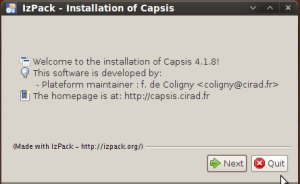Table of Contents
Capsis Installation Guide
This documentation is related to Capsis installation from an installer, either downloaded from the Download page or provided by a Capsis modeller.
Note: If you are a member of the Capsis co-development community, you have access to the complete version through our versionning system, please refer to the developper installation guide.
In case of trouble during the installation, have a look at the Capsis FAQ.
Capsis may be installed with the same installer on machines under Windows, Linux or Mac OS X.
1. Ensure java 1.8 is installed on your computer
To check the correct version of Java is installed and available, open a Terminal and check the answer to this command (must answer java 1.8.x)
# type this command java -version # you should get this kind of answer (note the "1.8.x") java version "1.8.0_101" Java(TM) SE Runtime Environment (build 1.8.0_101-b13) Java HotSpot(TM) 64-Bit Server VM (build 25.101-b13, mixed mode)
If java is not found on your system or the version is not 1.8.x, please have a look at the Java 8 installation page
2. Run the Capsis installer
Run the installer (capsis-setup-X.jar) by double clicking on it and follow the install instructions. If double clicking on a .jar file does not launch the installer on your system, open a terminal, change to the install directory and type
java -jar capsis-setup-file-name.jar
Where can I install Capsis ?
- Under Windows Vista, you must install in a directory where you have write privileges (for instance Documents).
- Under Windows, prefer directory names without spaces nor accents.
# Risky option ! C:\Users\Hélène\Documents\Master\capsis # Safer C:\capsis
3. Start Capsis
When the install is complete, use the Start menu or the Desktop shortcut to start Capsis.
If you cannot find a shortcut, open a terminal, move (with cd, see below) to the Capsis installation directory (often named 'capsis4/') and execute the capsis launching script.
How to open a terminal
- Windows: the terminal is also called 'Command prompt', you can find it by using the 'Type here to search' text field in the Windows Start menu: search 'Terminal' (or type 'cmd' in this search text field and Enter).
- Linux: open a Shell
- MacOSX: Terminal is an application (in Applications > Utilities)
# To start Capsis under Windows, if capsis4/ is in the 'C:\Users\Arthur' folder C:\> cd Users\Arthur\capsis4 C:\Users\Arthur\capsis4> capsis # Note: to move back to the upper directory: C:\Users\Arthur\capsis4> cd .. C:\Users\Arthur>
# To start Capsis under Linux or MacOSX, if capsis4/ is in the '/home/Arthur' folder /$ cd /home/Arthur/capsis4 /home/Arthur/capsis4$ sh capsis.sh
4. How does it work ?
Read the tutorial.

